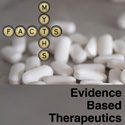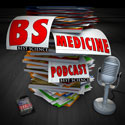Episode 17: Anti-Depressants: Some Issues in Managing Depression
In episode 17 we look at managing the treatment of depression once we’ve started a medication. We discuss the patient conversations necessary for initiating treatment including the patient perception of the illness, expectations and potential side-effects. We debate the quandaries around starting doses, when or if to increase, duration of therapy and relapse prevention. Although we use available evidence, we acknowledge some of our advice is Best-Guess based medicine.
Show Notes
1) Monitoring form for using antidepressants in children and adolescents
2) Clinical tool to monitor antidepressant treatment
3) Scales, doctors finding benefit (when there isn’t any)
4) Investigators’ conclusions on the efficacy of newer antidepressants in childhood depression have exaggerated their benefits
5) Benefit seen in 1 week with antidepressants
Arch Gen Psychiatry 2006;63:1217-23
6) The risk of recurrence progressively increases with each successive episode and decreases as the duration of recovery increases
Am J Psychiatry 2000;157:229–233)
7) Relapse due to stopping meds – relapse at 12 months – 18% on drugs 41% on placebo
8) 5mg of fluoxetine works Psychopharmacology Bulletin 1988;24:183-8



